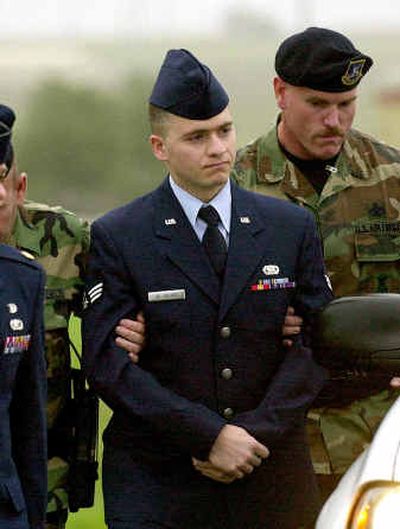Espionage charges against GI dropped

WASHINGTON – The government dropped espionage charges Wednesday against a Syrian-born interpreter at the Guantanamo Bay military prison, the third time in recent months that investigators have withdrawn security-related charges against a serviceman at the detention facility for suspected al Qaeda and Taliban fighters.
In an agreement with military prosecutors, Senior Airman Ahmad Al Halabi, who once faced 30 charges of spying and aiding the enemy that potentially carried the death penalty, pleaded guilty to four less serious charges.
Al Halabi is the second Muslim serviceman at the base, and the third person overall, to be cleared of serious accusations in cases that once led authorities to suspect a widespread espionage ring at the prison on a U.S. Navy base in Cuba. In March, a Muslim chaplain at the prison, Army Capt. James Yee, was cleared of charges that he had committed espionage and sedition.
Earlier this month the Army dropped charges against Reserve Col. Jackie Duane Farr, an intelligence officer at Guantanamo Bay who had been accused of trying to take classified documents from the base.
The court-martial of Al Halabi, an Air Force supply clerk who served for eight months as an Arabic translator at the Guantanamo Bay prison, had been set to begin this week at Travis Air Force Base in California.
Al Halabi was arrested in July 2003 at a Navy base in Florida as he was traveling to Syria to be married after his Guantanamo Bay assignment. Federal agents found hundreds of documents in his bags, including 180 letters on his laptop computer that previously had been sent by detainees to their families. Other documents included a list of detainees’ names and a map of the prison.
The government contended that Al Halabi, who was born in Syria and moved to Detroit as a teenager, planned to reveal the documents to unspecified “enemies” during his trip.
He was initially charged with 30 counts, including espionage and aiding the enemy, but over time the government dropped about half those accusations. He spent more than nine months in jail before being allowed to resume his job as a supply clerk at the base outside Sacramento last May.
The case was marred by irregularities. While searching Al Halabi’s possessions, a rookie Air Force investigator drank beer and failed to wear gloves as he opened a box of documents, testimony showed. Then he repacked the box and put on gloves before videotaping his reopening of the box.
On several occasions, military officials mistranslated Arabic-language documents, and Air Force agents were found to have been mistaken in asserting that Al Halabi had sent classified material by e-mail to unauthorized recipients.
Earlier this month, the Air Force backed off the allegation that hundreds of the documents found in Al Halabi’s possession, including the detainee letters, were classified. They concluded that only one document was classified.
Col. Jennifer Cassidy, a spokeswoman for the prosecution, acknowledged Wednesday that “there have been some oddities” in the case, but added, “this case shows that the military system is fair and just. As the evidence developed, charges were dropped. … It’s not a railroad job.”
But some military law experts were more critical. “To my dismay, this case makes military justice look bad,” said Gary Solis, a former Marine prosecutor who teaches the law of war at Georgetown University.
Yee’s attorney, Eugene Fidell, said that “people who should have known better were trigger-happy about throwing soldiers in jail,” a reference to both Al Halabi and Yee. “Cases where the gravest of allegations were raised have fizzled. … This leads to a loss of public confidence in the administration of justice, at a time we can’t afford it.”
Al Halabi pleaded guilty to taking unauthorized photos at the prison, illegally transporting classified documents to his quarters, lying to investigators and possessing unauthorized documents about prison operations when he was arrested last year in Florida.
One of Al Halabi’s lawyers, Donald Rehkopf, told reporters Wednesday that those were “minor infractions,” according to wire reports. But Cassidy disagreed. “The charges are pretty serious, in terms of the severity of the documents” Al Halabi had, she said. “The Air Force feels there are terms within (the agreement) that will benefit the Air Force.”
Cassidy declined to disclose the terms of the plea bargain, but said one of its provisions is an agreed-upon maximum sentence. The judge, Col. Barbara Brand, is expected to sentence Al Halabi within a few days.
Yee, a West Point graduate who was held in custody for 76 days, was told he would be charged with espionage. Ultimately he faced lesser charges, including mishandling classified papers, and was found guilty only of adultery and storing pornographic images on a government computer. His formal reprimand for those offenses was later thrown out.